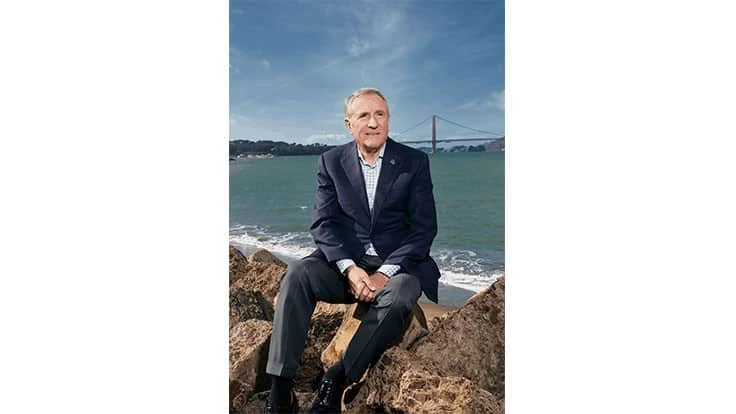

It doesn’t take long talking to Recology President and CEO Michael J. Sangiacomo to see that the San Francisco-based waste management company has a different perspective than most other companies operating today.
With a vision predicated on “a world without waste,” Sangiacomo stresses that the company’s sustainability-minded focus doesn’t just pertain to its collection operations, it is part of a larger ideal centered on building a company designed to last.
A strong foundation
According to Sangiacomo, Recology traces its roots back to San Francisco’s Gold Rush era when immigrants came from Italy to make a living sorting through the city’s refuse in search of salvageable materials. They washed, repackaged and sold bottles to wineries; sorted rags and papers from other refuse; and recovered wood and other reusable materials. Eventually, waste collection became more organized in the city, and the descendants of the first wave of Italian immigrants helped incorporate the first Recology operating company in 1920.
Over the years, the company has steadily grown and expanded its operations. Within the last 20 years, the company has branched out to expand its California operations beyond the Bay Area and has set up divisions in both Oregon and Washington. Today, Recology leverages its 45 operating companies and network of 3,800 employees to provide service to more than 140 communities, serving more than 889,000 residential and 112,000 commercial customers. With its 20 company-owned facilities and fleet of 1,300 vehicles, Sangiacomo says Recology collected and processed 2.8 million tons of material in 2019, making it the eighth largest waste and recycling firm in the industry.
The importance of diversion

Of the 2.8 million tons of material the company collected in 2019, Sangiacomo says that much of it was repurposed through programs for reuse, recycling, composting or energy generation.
Even though others in the industry have begun to rethink their recycling and reuse programs in the wake of China’s National Sword, Sangiacomo says the ramifications of China’s policy have only entrenched Recology’s emphasis on resource recovery.
“Resource recovery is the guiding force behind our work at Recology and has remained so in the wake of China’s National Sword,” he says. “We believe China’s policy change was the wakeup call the industry and public needed to clean up our material stream and evaluate our capacity to handle material domestically. [Our company] began by processing materials locally; we believe we need to return to that paradigm.”
He says that beyond necessary operational changes waste companies need to make to adjust to current market conditions, new policies are required to support sustainable materials management.
Sangiacomo says that over the past year, Recology has been vocal in pushing for policy reform, including challenging the plastics industry to be better stewards of the products they create. He says the company’s work has been centered on challenging producers to make consumer packaging products more recyclable and create a market for materials that currently have no value after their single use.
Late last year, alongside two other signatories, Sangiacomo filed a ballot measure in California that, among other goals, seeks to create a funding mechanism for recycling infrastructure. The proposed measure would require state regulations to reduce plastic waste, tax producers of single-use plastics and fund environmental programs.
While the company’s mission is bold, Sangiacomo says that a comprehensive approach to diversion is needed to change the status quo.
“We continue to advocate for source reduction as a key to success,” he says. “Making less stuff, consuming less, and asking producers of consumer goods and packaging to design [products] to last and prioritize reuse and recycling remain important tenets to our success in diverting from landfills.”
Another priority in the company’s quest to make recycling more viable is helping residents cut down on contamination at the curb. Sangiacomo says the company’s drivers are key in helping spread the message on what should go in the waste cart and what can be diverted.
“Our drivers are our principal connection with our customers,” he says. “They’re the most visible representatives of Recology, picking up recyclables, compostables and garbage every single day. They talk to customers and develop relationships, supporting our efforts to become an integrated part of the community.”
The company also deploys its Waste Zero teams to provide education and outreach services to the public. Currently, 60 Recology employees serve on these teams, which visit schools, community organizations, restaurants, hotels and businesses to help set up and properly manage recycling and composting programs. Sangiacomo says these teams tailor programs to meet the specific needs of the customer at no additional cost.
Complicating the company’s efforts to reduce contamination is the growing reliance on composting in the areas the company operates.
Recology built the first large-scale compost facility in California in 1996. In 2002, the company launched a three-cart collection system in San Francisco and asked residents and businesses to separate recyclables, organics and residuals. In 2004, the city enacted a mandatory recycling ordinance, and on the coattails of this ordinance’s success, San Francisco passed a mandatory composting ordinance in 2009.
To help meet the increased processing demands for the organics the company collects, Recology owns and operates five compost facilities in California and three in Oregon. After the company collects waste at the curb, food and yard waste materials are generally transferred to one of these facilities and turned into nutrient-rich compost that is sold to landscapers, farmers, vintners and community gardens.
According to Sangiacomo, being able to process organics has yielded substantial benefits to the community.
“Our organic waste programs are recognized as trendsetting throughout the industry. … Organics collection and processing represents a huge opportunity to keep valuable resources out of the landfill and reduce methane produced by the decomposition of organic matter,” he says. “Composting this organic material helps replace diminishing topsoil and return nutrients to the soil to produce healthy plants. Composting provides one of the largest opportunities to recycle material and support closed loop ecosystems.”
Making the investment
Regardless of the level of community education the company undertakes, Recology remains the last line of defense in combating contamination and increasing the purity of its recycling operations.
Recycle Central at Pier 96 is the 200,000-square-foot sorting facility that serves as the workhorse of the company’s San Francisco’s recycling program. Over the past four years, the company has invested more than $20 million at the facility installing state-of-the-art recycling equipment to help improve its operations. The new machines have wider conveyor belts, run at higher speeds and help keep material like single-use plastic out of finished bales of mixed paper.
In September 2019, Recology installed four Max-AI AQC robots from Bulk Handling Systems at the facility. The robots are tasked with recovering plastic that would otherwise be lost as residue and helping ensure the company is outputting high-quality bales of finished plastics. The robots also work to improve quality control for PET bottles, recover natural and color HDPE that may have been missed by existing optical sorters, and remove black plastics that optical sorters have trouble identifying.
According to Sangiacomo, these robots aren’t meant to be a replacement for existing staff, but rather, a complement.
“We see automation as an important next step toward technological advancement in recycling, but this new technology cannot replace human judgment,” he says. “The robotic sorting machines at Recycle Central will be used to perform some of the dirtier jobs, and employees will be provided more technical positions, [allowing them to] develop new skills needed to manage and maintain high-tech equipment.”
In addition to the company’s recycling infrastructure, Recology has also made the investment in more sustainable fleet technology.
Sangiacomo says that Recology maintains a portfolio of eight fuel and energy types and is moving towards more renewable fuel sources each year. Recently, the company contracted with New Way and BYD to build two first-of-their-kind rear load electric collection vehicles in partnership with the city of Seattle. These investments are all part of a greater plan to lessen the company’s reliance on fossil fuels.
“We are committed to transitioning away from conventional fossil fuels and have committed to power 90 percent of our fleet by renewable or alternative energy sources by 2022, leveraging our existing use of renewable diesel, biomethane fuels and fleet electrification. … We continually seek to embrace innovation in vehicle technology as we work to define what a 21st century collection vehicle can—and should—look like,” he says.

A people-first business
In 1986, Recology implemented an employee stock ownership plan. This decision established Recology as one of the largest 100-percent employee-owned companies in the United States.
Sangiacomo says that this arrangement has yielded greater buy-in from employees, which has helped to propel the company’s growth.

“Recology is the largest employee-owned company in the waste industry. Employee ownership has benefited Recology by fostering a culture of individual and collective hard work and dedication that directly benefits employee-owners and affects the long-term success of the company,” he says. “As owners, each employee shares in the company’s success. The immediacy of that relationship motivates employees to invest in their work, resulting in greater customer satisfaction and quality products and services.”
Although the company’s ownership structure and recovery-first ethos might differ from other haulers, Sangiacomo says that it is all part of Recology’s mission to do what’s right versus what is easy.
“What has worked for Recology is prioritizing people, providing great service and caring for the environment,” he says.
"Resource recovery is the guiding force behind our work at Recology and has remained so in the wake of China’s National Sword,” – Michael J. Sangiacomo, CEO, RECOLOGY
“Our employees are owners of our business and must be treated fairly. They are our primary contact with our customers and seek to integrate Recology into our communities to provide exemplary service. We are dedicated stewards of the environment, especially in the areas where Recology operates, and have found that our customers maintain similar values,” he says. If it’s true that you reap what you sow, it should be no surprise that Recology’s history of investing in its people, the communities it operates in and the environment has helped the company establish itself as one of the most successful in waste. But despite its successes over the last 100 years, Sangiacomo says the company remains as steadfast as ever in making sure it’s doing right by its stakeholders.
“There are many opportunities for Recology to grow, expand our service offerings, create greater and more localized processing infrastructure, make diversion successes, and find new and better ways of accomplishing our goals,” he says. “But we will always remain focused on selecting the opportunities that create value for Recology owners and the communities we serve.”
The author is the editor of Waste Today magazine and can be contacted at aredling@gie.net.

Explore the January February 2020 Issue
Check out more from this issue and find your next story to read.
Latest from Waste Today
- DTG Recycling faces $3.3M penalty from Washington Utilities and Transportation Commission
- EPA adds 9 PFAS to Toxics Release Inventory list
- Recycling Today Media Group's battery recycling conference relocates in 2025
- EPA issues first underground injection permits for carbon sequestration in California
- Blizzard interrupts collection routes
- Chiquita Canyon Landfill closes active waste disposal operations
- Highland Sanitation awarded solid waste and recycling contract in Wanamingo, Minnesota
- First NYC commercial waste zone is operational





